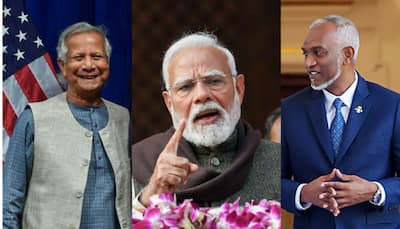The Ministry of External Affairs has allocated Rs 5,483 crore for foreign aid in the Union Budget 2025-26, up from Rs 4,883 crore last year. This financial year, ‘Neighbourhood First’ and ‘Look East’ policies seems to drive India’s aid priorities.
A whooping 64% of the total scheme portfolio (Rs 4,320 crore) has been allocated to its immediate neighbors for various initiatives, including major infrastructure projects like hydroelectric plants, power transmission lines, housing, roads, bridges, and integrated check-posts.
Bhutan remains India’s top recipient of foreign aid, with an allocation of ₹2,150 crore for 2025-26, up from ₹2,068 crore last year. India continues to be Bhutan’s key development partner, providing financial support for infrastructure, hydropower projects, and economic collaboration.
New Delhi has increased its financial assistance to the Maldives by Rs 130 crore, raising the total aid to Rs 600 crore from Rs 470 crore in the 2024-25 budget. This makes the Maldives one of the largest beneficiaries of India’s foreign aid, second only to Bhutan in priority among neighboring countries.
This increase comes at a time when Malé is actively working to rebuild its relationship with New Delhi, following a period of diplomatic tensions that arose after the election of President Mohamed Muizzu, who dominantly puts forward a pro-China stance.
India has retained its financial aid to Bangladesh at Rs 120 crore for 2025-26, with no increase from the previous year. The decision comes amid diplomatic tensions following the exit of former Prime Minister Sheikh Hasina, who has been granted asylum in India.
The new government, led by Muhammad Yunus, has formally requested her return, adding to the ongoing political strain between the two nations.
India has significantly reduced its financial aid to Afghanistan, cutting the allocation from Rs 200 crore last year to Rs 100 crore in the 2025-26 budget—a steep drop from Rs 207 crore granted two years ago. The move reflects Prime Minister Narendra Modi’s cautious approach toward the Taliban regime, with its engagement largely restricted to humanitarian aid and economic cooperation.
Earlier this year, Deputy National Security Adviser Vikram Misri held talks with Taliban officials in Dubai, marking the highest-level interaction since the group’s takeover of Kabul. The discussions focused on trade and India’s strategic interests in Iran’s Chabahar Port, a key transit hub that offers an alternative trade route bypassing Pakistan.
Despite these engagements, India has yet to extend official recognition to the Taliban government.
Stay informed on all the , real-time updates, and follow all the important headlines in and on Zee News.










